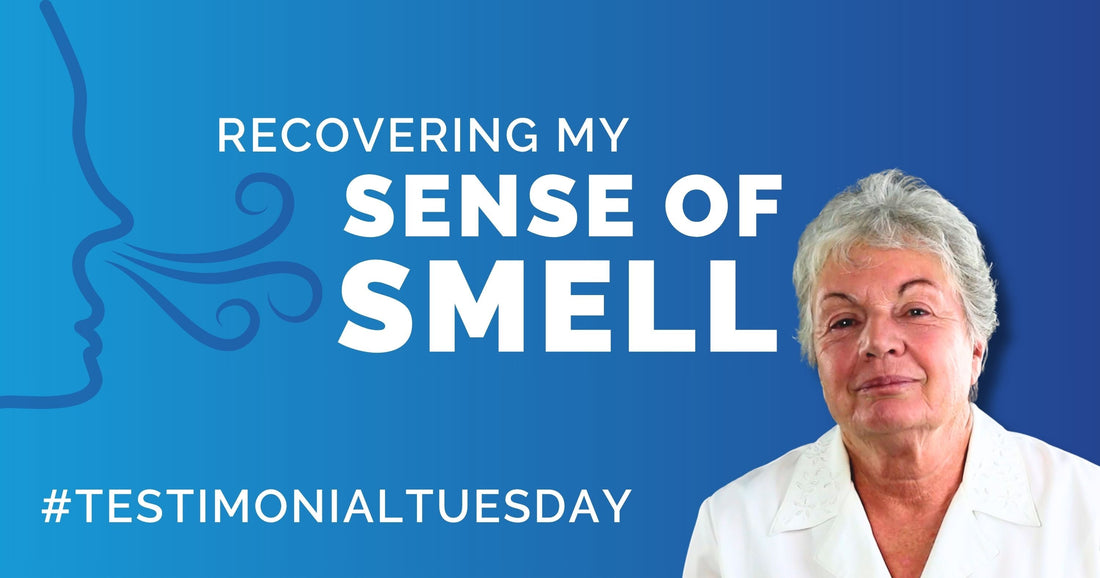
I Thought My Sense of Smell Was Gone Forever… | Anosmia Recovery with the Rezzimax Tuner
Share
If You Had to Lose One Sense—Which Would You Choose?
If someone asked you which sense you’d be willing to live without — sight, hearing, touch, taste, or smell — you might instinctively choose smell.
At first, it seems like the least essential. After all, you can still function, communicate, and move through life without it. But people who have truly lost their sense of smell will tell you otherwise: it can deeply affect your emotions, safety, and quality of life.

Smell is tightly linked to memory and emotion — it’s why a certain perfume can transport you back decades or why the scent of cookies reminds you of childhood. It’s also the main contributor to our sense of taste. Without smell, food loses its richness and complexity; coffee, chocolate, and fruit all taste dull and one-dimensional.

That’s the reality for millions of people living with anosmia, the medical term for the loss of smell — a condition that became widely recognized during the COVID-19 pandemic.
The Rise of Anosmia After COVID-19
Before 2020, anosmia was considered relatively rare. Then came COVID-19. One of the hallmark symptoms of the virus was sudden loss of smell and taste — often without nasal congestion.

While many recovered within weeks, a significant number experienced long-term smell loss lasting months or even years after infection. This type of post-viral anosmia occurs when inflammation or viral damage disrupts the delicate olfactory nerves responsible for detecting and processing odors.
For some, the sense of smell slowly returns. For others, it never fully comes back, leading to frustration, depression, and a sense of disconnection from daily pleasures. Sharik had the chance to discuss the effects of long haul COVID with Dr. Patrick Jones recently.
Elaine’s Story: Regaining Her Sense of Smell After Years of Loss
Elaine’s journey with anosmia began before the pandemic. After a severe nasal infection, she completely lost her ability to smell. Doctors and specialists told her that once the sense of smell is gone, it’s gone forever — that there was nothing more they could do.
Later, she learned about Sharik Peck, physical therapist and inventor of the Rezzimax Tuner, after her daughter-in-law found relief from chronic migraines using the same device.
When Elaine visited Sharik to help her husband with balance therapy, she tried the Tuner herself to relieve sinus congestion. To her surprise, not only did her breathing improve — she began noticing faint smells again.
“It’s been about two months since I started using the Tuner,” Elaine said. “Now I can smell bread baking and fresh laundry again. It’s amazing to me how much has come back — something I thought I had lost forever.”
What Causes Anosmia?
Anosmia can result from a variety of factors, including:
- Viral infections such as COVID-19 or influenza
- Chronic sinus infections or nasal polyps
- Head trauma or nerve damage
- Exposure to toxins or certain medications
- Neurological conditions such as Parkinson’s or Alzheimer’s disease
In most cases, smell loss happens when inflammation or injury disrupts the olfactory nerve pathways between the nose and brain. Traditional medical treatments often include steroids, nasal sprays, or olfactory training (smelling specific scents daily to retrain the brain).

While these can help some people, many are left searching for additional, non-invasive ways to support recovery.
How Resonance Therapy May Support Healing
The Rezzimax Tuner uses gentle vibration — what’s known as resonance therapy — to stimulate areas of the face, head, and neck. Our Head & Neck Rezzipe would be a great place to start.
This vibration is designed to calm the nervous system, improve blood flow, and support communication between the body and brain. When applied near the sinus and nasal regions, resonance therapy may help:
- Reduce inflammation and congestion
- Stimulate sensory and cranial nerves involved in smell
- Promote a balanced, restorative state for neural recovery

Although more research is needed to understand exactly how vibration therapy influences smell recovery, many users report feeling more relaxed, breathing more clearly, and, in some cases, regaining sensory perception over time.
The Science of Smell and the Nervous System
Your sense of smell is closely connected to your nervous system. The olfactory nerves send signals directly to areas of the brain responsible for emotion, memory, and healing — including the limbic system.
When the body is stressed, tense, or inflamed, those pathways can become less responsive. Gentle vibration through resonance therapy helps calm the autonomic nervous system, encouraging the body to shift into a state more conducive to healing and neural repair.
Finding Hope After Smell Loss

For many, anosmia feels permanent — but stories like Elaine’s remind us that the body’s ability to heal is powerful and sometimes surprising. While the Rezzimax Tuner is not a cure, its resonance-based approach offers a natural, non-invasive way to support the body’s natural recovery processes and promote overall nervous system balance.
If you’ve lost your sense of smell due to illness, injury, or COVID-19, exploring resonance therapy may offer a hopeful step forward in your journey toward recovery.